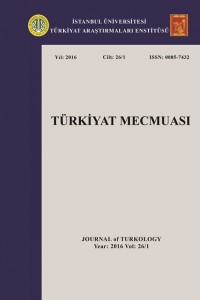Öz
Our archives those have a vast treasure with their rich belongings are waiting
for the researchers who will bring the literary works they include to light and
who will establish a bridge between the past and the future. Bursawī
Muhyiddin Khalifa’s work entitled Ibratnâma is a sort of mathnawî which can
be accepted among the religious-sufi and also moral mathnawîs. The
manuscript consists of 310 leaves. In our study, we will try analyse the poet
and his work as well as the mathawî genre and the period in which he lived.
Ibratnâma consists of 6360 verses; 656 quatrains composed in 55 pieces; and
also two prose sections consisting of 27 leaves. Although it seems to be
written in ‘Fâ‘ilâtûn, fâ‘ilâtûn, fâ‘ilûn’ metre, we decided to accept the metre
of the work as syllabic metre by taking the possibility of being written in
syllabic metre into consideration as we cannot apply that pattern in many parts
of the work. Thus, we can examine the parts beginning with the words or word groups of “mevize ve nakildir ki” as prose. The poet supports his words
by the verses of the Qur’an and by the sayings of the Prophet when he tells the
readers direct exemplary records. He enlists the moral rules as well as the
admonishments on human relations. Most of these exemplary records and the
admonishments marks the transiency of this worldly life, the next-worldly life
and the necessity of the guidance by a spiritual master who is a Universal Man
when preparing for the next World.
Öz
Zengin varlığı ile büyük bir hazineye sahip arşivlerimiz, muhafaza ettikleri edebî eserleri gün yüzüne çıkarabilecek ve böylece geçmiş ile gelecek arasında bir köprü oluşturabilecek araştırmacıları beklemektedir. Bursevî Muhyiddin Halîfe’nin İbretnâme isimli eseri, dinî-tasavvufi ve ahlakî mesneviler arasına alabileceğimiz türde bir mesnevidir. Eser 310 varaklık bir yazmadır. Bu çalışmamızda şair ve eseri hakkında incelemeler yapmanın yanında mesnevi türü ve şairin yaşadığı dönem hakkında bilgiler de vereceğiz. İbretnâme, 6360 beyit; 55 parçadan ibaret 656 dörtlük ve 27 varaklık iki parça mensur bölümlerden müteşekkildir. Fâ‘ilâtün, fâ‘ilâtün, fâ‘ilün vezni ile yazılmış gibi görünse de bu vezni eserin pek çok yerinde uygulayamadığımız için hece vezni ile yazılmış olma ihtimalini göz önüne alarak eserin veznini hece olarak kabul etmeyi uygun bulduk. Eserin “mevize ve nakildir ki” söz veya grubuyla başlayan yerlerini ise mensur kabul ederek tetkik edebiliriz. Şair eserinde, okuyucuya doğrudan ibretlik vesikalar anlatırken sözlerini ayet ve hadislerle desteklemiştir. Eserde ahlakî kuralların yanı sıra beşerî münasebetlere dair öğütler de sıralanmaktadır. Bu öğütlerin veya ibretlik vesikaların büyük bir kısmı dünya hayatının geçiciliğine, ahiret hayatına ve bu hayata hazırlanırken mutlaka kâmil bir mürşidin elinden tutmak gerektiğine işaret etmektedir.
Ayrıntılar
| Bölüm | MAKALELER |
|---|---|
| Yazarlar | |
| Yayımlanma Tarihi | 30 Haziran 2016 |
| Yayımlandığı Sayı | Yıl 2016 Cilt: 26 Sayı: 1 |


